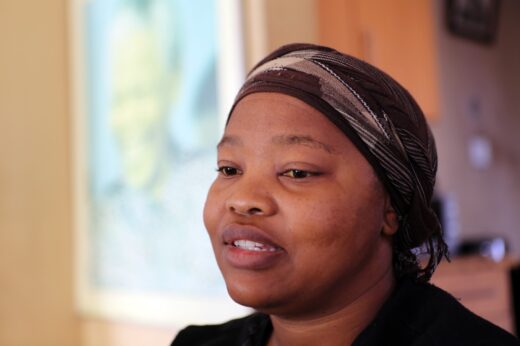Boipatong massacre forgotten
BOIPATONG. - Three decades ago, in a horrifying act of violence, Mita Molete suffered a life-altering axe attack, rendering her permanently paralyzed.

This gruesome incident unfolded during a bloody massacre, perpetrated by armed individuals from the nearby KwaMadala Hostel, situated approximately 1 km away from the township.

survivor of the Boipatong massacre talks on how
government forgot their day. Photo: Sifiso Jimta.
The fateful day claimed the lives of around forty-five individuals, leaving several others gravely injured. While Molete, now thirty-years-old, valiantly shares her personal account annually, she ceaselessly voices her discontent over the government’s apparent abandonment of their cause.
Sadly, other affected families, who preferred not to engage with the media, assert that the Boipatong, Sharpeville, and Sebokeng massacres are gradually fading from collective memory. Unless haphazardly organized, these tragic events are either poorly commemorated or not commemorated at all. This year, the Boipatong massacre, marking its 31st anniversary, regrettably went unnoticed. No official wreath-laying ceremony or any form of commemoration transpired.
Sedibeng District Municipality, the custodian of our historical heritage, confirmed the existence of an approved budget, eagerly awaiting an opportune date to rectify this overlooked event.
Reflecting on that fateful day, Molete recounted the harrowing experience endured by her and her mother during the ruthless killing spree.
“My mother and I sustained injuries as the violence unfolded. Tragically, my father succumbed to his severe wounds.
Urgently transported to the hospital, I received immediate aid from my resourceful mother, well-versed in first aid, before receiving proper medical attention,” Molete shared.
“Upon my arrival at the hospital, my mother observed the limited mobility in my hand, immediately recognizing the harrowing reality of my paralysis, a condition that has consigned me to a wheelchair ever since,” she added.
Expressing her disappointment regarding this year’s commemoration, Molete conveyed her profound sense of abandonment by the government. “Regrettably, we have
grown accustomed to the government’s inconsistent approach to commemoration.
Though I do not wish to sound indifferent, this has become an unfortunate norm for us.
Boipatong’s legacy remains tarnished and forgotten, casting a glaring light upon our collective abandonment,” Molete lamented.
“I earnestly yearn for the recognition and celebration of this day, akin to the commemoration
accorded to other historic events, formally incorporated into our national calendar.
Currently, only June 16 holds official recognition as a holiday, leaving our day absent from the collective consciousness, inevitably facilitating its gradual fade into oblivion,” she passionately asserted. Saviour Kgaswane, spokesperson for Sedibeng District Municipality, emphasised the municipality’s diligent planning and budget allocation for the anticipated 2023 commemorative event.
“We actively engaged in comprehensive meetings, ensuring our unwavering support and involvement in this year’s program. The district municipality faithfully upholds its responsibility to preserve and commemorate historical events. Our commitment and active participation in the deliberations of the 2023 Boipatong Massacre Commemorative Event underscore our unequivocal dedication,” Kgaswane affirmed.
“The municipality eagerly awaits a new date, to be determined by the Boipatong community in conjunction with the Gauteng Department of Sport, Arts, Culture, and Recreation. This eagerly anticipated occasion will enable us to fulfil our commitment to hosting and commemorating this year’s event,” he concluded with assurance.

